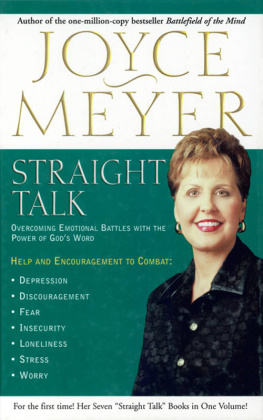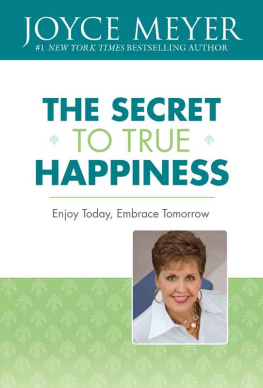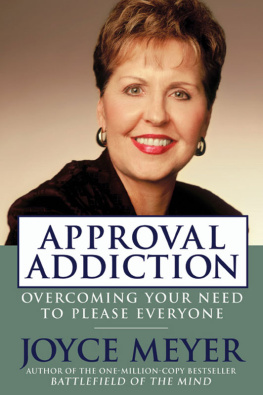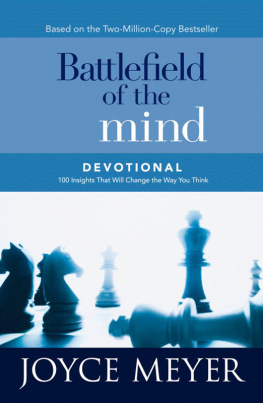Joyce Meyer - Powerful Thinking
Here you can read online Joyce Meyer - Powerful Thinking full text of the book (entire story) in english for free. Download pdf and epub, get meaning, cover and reviews about this ebook. year: 2021, publisher: FaithWords, genre: Religion. Description of the work, (preface) as well as reviews are available. Best literature library LitArk.com created for fans of good reading and offers a wide selection of genres:
Romance novel
Science fiction
Adventure
Detective
Science
History
Home and family
Prose
Art
Politics
Computer
Non-fiction
Religion
Business
Children
Humor
Choose a favorite category and find really read worthwhile books. Enjoy immersion in the world of imagination, feel the emotions of the characters or learn something new for yourself, make an fascinating discovery.

- Book:Powerful Thinking
- Author:
- Publisher:FaithWords
- Genre:
- Year:2021
- Rating:3 / 5
- Favourites:Add to favourites
- Your mark:
- 60
- 1
- 2
- 3
- 4
- 5
Powerful Thinking: summary, description and annotation
We offer to read an annotation, description, summary or preface (depends on what the author of the book "Powerful Thinking" wrote himself). If you haven't found the necessary information about the book — write in the comments, we will try to find it.
Powerful Thinking — read online for free the complete book (whole text) full work
Below is the text of the book, divided by pages. System saving the place of the last page read, allows you to conveniently read the book "Powerful Thinking" online for free, without having to search again every time where you left off. Put a bookmark, and you can go to the page where you finished reading at any time.
Font size:
Interval:
Bookmark:

Copyright 2021 by Joyce Meyer
Cover copyright 2021 by Hachette Book Group, Inc.
Hachette Book Group supports the right to free expression and the value of copyright. The purpose of copyright is to encourage writers and artists to produce the creative works that enrich our culture.
The scanning, uploading, and distribution of this book without permission is a theft of the authors intellectual property. If you would like permission to use material from the book (other than for review purposes), please contact permissions@hbgusa.com. Thank you for your support of the authors rights.
FaithWords
Hachette Book Group
1290 Avenue of the Americas, New York, NY 10104
faithwords.com
twitter.com/faithwords
First Edition: June 2021
FaithWords is a division of Hachette Book Group, Inc. The FaithWords name and logo are trademarks of Hachette Book Group, Inc.
The publisher is not responsible for websites (or their content) that are not owned by the publisher.
The Hachette Speakers Bureau provides a wide range of authors for speaking events. To find out more, go to www.hachettespeakersbureau.com or call (866) 376-6591.
Unless otherwise noted, Scripture quotations are taken from the Holy Bible, New International Version, NIV. Copyright 1973, 1978, 1984, 2011 by Biblica, Inc. Used by permission of Zondervan. All rights reserved worldwide. www.zondervan.com The NIV and New International Version are trademarks registered in the United States Patent and Trademark Office by Biblica, Inc. | Scripture quotations marked AMPC are taken from the Amplified Bible, Copyright 1954, 1958, 1962, 1964, 1965, 1987 by The Lockman Foundation Used by permission. www.Lockman.org. | Scripture quotations marked NKJV are taken from the New King James Version. Copyright 1982 by Thomas Nelson. Used by permission. All rights reserved. | Scripture quotations marked MSG are taken from THE MESSAGE, copyright 1993, 2002, 2018 by Eugene H. Peterson. Used by permission of NavPress. All rights reserved. Represented by Tyndale House Publishers, a Division of Tyndale House Ministries. | Scripture quotations marked ESV are from the ESV Bible (The Holy Bible, English Standard Version), copyright 2001 by Crossway, a publishing ministry of Good News Publishers. Used by permission. All rights reserved.
Library of Congress Cataloging-in-Publication Record available at https://lccn.loc.gov/2020054045
ISBNs: 978-1-5460-1598-7 (paper over board), 978-1-5460-1605-2 (ebook)
E3-20210427-JV-NF-ORI
Whatever you hold in your mind will tend to occur in your life. If you continue to believe as you have always believed, you will continue to act as you have always acted. If you continue to act as you have always acted, you will continue to get what you have always gotten. If you want different results in your life or your work, all you have to do is change your mind.
A NONYMOUS
A re you completely satisfied with every aspect of your life? Or are there areas you would like to change? Are there parts of your life where you feel you need to grow and become stronger? Are there goals you want to reach and dreams you long to fulfill? Is there something you believe you were made to do or be, and you just cant seem to get there? The key to changing your life is changing your thinking. As you develop thought patterns (mindsets) that agree with Gods Word, everything about your existence will begin to improve. In some cases, your experiences will change, and in other situations, the change in your thinking will cause you to view the same circumstances from a different perspectiveand that will change your life. Either way, you win.
Your thinking is more powerful than you may realize. Everything in life begins with a thought, and your thoughts become the mindsets that chart your course in life and ultimately determine your destination. Your mindsets impact everything within you and everything you encounter. Every word you speak and every action you take originates in the mind. Your mindsets form your attitudes; they produce certain opinions and perspectives; they shape your self-image; they affect your relationships; they determine how productive you will be personally and professionally; they heavily influence your priorities; they guide the way you use your time, energy, and financial resources; and they make the difference between success and failure. There is no area of your life that your thinking does not touch. I cannot overemphasize how significant your thoughts are.
Your thinking can work for you or against you in surprisingly powerful ways. This is because the mind is not simply a function of your human body; it is part of the human soul, along with the emotions and the will (the ability to make choices). The mind is also a spiritual battleground, and the thoughts you think will either help you grow in your relationship with God or hinder you by causing you to think the way your enemy, Satan, wants you to think. It is the ground on which you wage war not only with the enemy over your personal life and your destiny, but also with worldviews and concepts or ideas that threaten to deceive you. It is the battlefield on which you make the decisions that lead to frustration and defeat or the ones that lead to strength, health, love, joy, peace, and abundance.
Scripture clearly teaches that we become what we think about. Thoughts and mindsets have the ability to make people happy, positive, strong, successful people or frustrated, negative, weak people. Mindsets make the difference between those who reach their goals and live their dreams and those who never seem to be able to do what they really want to do.
Before I continue, I want to state emphatically that I do not believe we can think into existence anything we want. That view of the power of thoughts is a form of humanism, which is an ungodly philosophy. But simply recognizing the fact that thoughts are powerful is not humanistic at all. In fact, its quite biblical, according to Proverbs 23:7 ( NKJV ).
The Bible teaches us that our minds must go through a process of renewal in order to experience Gods plan for us (Rom. 12:2). His thoughts are above our thoughts (Isa. 55:89), so in order to walk with Him and experience His good plans for our lives, we must learn to think as He thinks. Human nature is not bent toward thinking godly thoughts, but we can choose and discipline ourselves to do so.
Few people realize that we have the ability to choose our thoughts and decide what we want to think; most of us passively meditate on whatever comes into our minds without ever realizing that the enemy uses our minds to control us and keep us from fulfilling Gods plans and purposes for our lives. It is important to understand that while becoming a Christian immediately affects a persons heart and spirit, it does not suddenly cause a person to think differently. Each person who experiences regeneration through receiving Jesus Christ as Savior and Lord receives a new spirit and a new heart from God. But our natural minds must be renewed, and we must learn to think with the mind of Christ in accordance with Gods Word. The intent of a persons heart may be pure while the mind is still confused. The Bible declares that we are to be transformed by the entire renewal of our minds and attitudes (Rom. 12:2). We do this through diligent, thorough study of Gods Word and thinking accordingly.
Choosing to think powerfully is not always easy. One of the greatest breakthroughs I have ever experienced took place when I finally realized I had the ability to control my thoughts, and one of the greatest challenges I have ever faced was the challenge to change my thinking once I realized that was possible. You can read more about my journey toward godly thinking in my books
Font size:
Interval:
Bookmark:
Similar books «Powerful Thinking»
Look at similar books to Powerful Thinking. We have selected literature similar in name and meaning in the hope of providing readers with more options to find new, interesting, not yet read works.
Discussion, reviews of the book Powerful Thinking and just readers' own opinions. Leave your comments, write what you think about the work, its meaning or the main characters. Specify what exactly you liked and what you didn't like, and why you think so.















